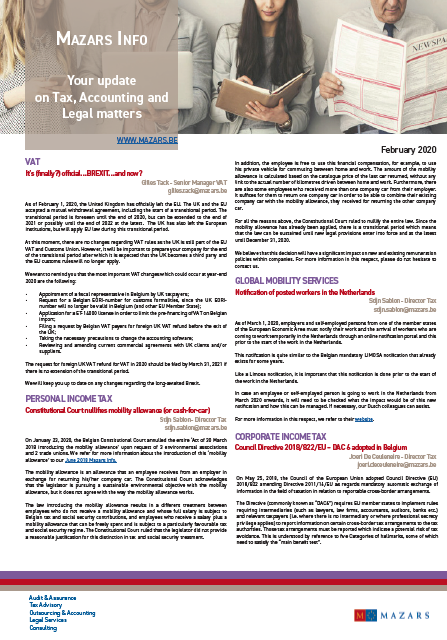
Mazars Info February 2020
VAT
It’s (finally?) official…BREXIT…and now?
As of February 1, 2020, the United Kingdom has officially left the EU. The UK and the EU accepted a mutual withdrawal agreement, including the start of a transitional period. The transitional period is foreseen until the end of 2020, but can be extended to the end of 2021 or possibly until the end of 2022 at the latest. The UK has also left the European institutions, but will apply EU law during this transitional period.
At this moment, there are no changes regarding VAT rules as the UK is still part of the EU VAT and Customs Union. However, it will be important to prepare your company for the end of the transitional period after which it is expected that the UK becomes a third party and the EU customs rules will no longer apply.
We want to remind you that the most important VAT changes which could occur at year-end 2020 are the following:
- Appointment of a fiscal representative in Belgium by UK taxpayers;
- Request for a Belgian EORI-number for customs formalities, since the UK EORI-number will no longer be valid in Belgium (and other EU Member State);
- Application for a ET-14000 license in order to limit the pre-financing of VAT on Belgian import;
- Filing a request by Belgian VAT payers for foreign UK VAT refund before the exit of the UK;
- Taking the necessary precautions to change the accounting software;
- Reviewing and amending current commercial agreements with UK clients and/or suppliers.
The request for foreign UK VAT refund for VAT in 2020 should be filed by March 31, 2021 if there is no extension of the transitional period.
We will keep you up to date on any changes regarding the long-awaited Brexit.
PERSONAL INCOME TAX
Constitutional Court nullifies mobility allowance (or cash-for-car)
On January 23, 2020, the Belgian Constitutional Court annulled the entire ‘Act of 30 March 2018 introducing the mobility allowance’ upon request of 3 environmental associations and 2 trade unions. We refer for more information about the introduction of this ‘mobility allowance’ to our June 2018 Mazars Info.
The mobility allowance is an allowance that an employee receives from an employer in exchange for returning his/her company car. The Constitutional Court acknowledges that the legislator is pursuing a sustainable environmental objective with the mobility allowance, but it does not agree with the way the mobility allowance works.
The law introducing the mobility allowance results in a different treatment between employees who do not receive a mobility allowance and whose full salary is subject to Belgian tax and social security contributions, and employees who receive a salary plus a mobility allowance that can be freely spent and is subject to a particularly favourable tax and social security regime. The Constitutional Court ruled that the legislator did not provide a reasonable justification for this distinction in tax and social security treatment.
In addition, the employee is free to use this financial compensation, for example, to use his private vehicle for commuting between home and work. The amount of the mobility allowance is calculated based on the catalogue price of the last car returned, without any link to the actual number of kilometres driven between home and work. Furthermore, there are also some employees who received more than one company car from their employer. It suffices for them to return one company car in order to be able to combine their existing company car with the mobility allowance, they received for returning the other company car.
For all the reasons above, the Constitutional Court ruled to nullify the entire law. Since the mobility allowance has already been applied, there is a transitional period which means that the law can be sustained until new legal provisions enter into force and at the latest until December 31, 2020.
We believe that this decision will have a significant impact on new and existing remuneration policies within companies. For more information in this respect, please do not hesitate to contact us.
GLOBAL MOBILITY SERVICES
Notification of posted workers in the Netherlands
As of March 1, 2020, employers and self-employed persons from one of the member states of the European Economic Area must notify their work and the arrival of workers who are coming to work temporarily in the Netherlands through an online notification portal and this prior to the start of the work in the Netherlands.
This notification is quite similar to the Belgian mandatory LIMOSA notification that already exists for some years.
Like a Limosa notification, it is important that this notification is done prior to the start of the work in the Netherlands.
In case an employee or self-employed person is going to work in the Netherlands from March 2020 onwards, it will need to be checked what the impact would be of this new notification and how this can be managed. If necessary, our Dutch colleagues can assist.
For more information in this respect, we refer to their website.
CORPORATE INCOME TAX
Council Directive 2018/822/EU – DAC 6 adopted in Belgium
On May 25, 2018, the Council of the European Union adopted Council Directive (EU) 2018/822 amending Directive 2011/16/EU as regards mandatory automatic exchange of information in the field of taxation in relation to reportable cross-border arrangements.
The Directive (commonly known as "DAC6") requires EU member states to implement rules requiring intermediaries (such as lawyers, law firms, accountants, auditors, banks etc.) and relevant taxpayers (i.e. where there is no intermediary or where professional secrecy privilege applies) to report information on certain cross-border tax arrangements to the tax authorities. Those tax arrangements must be reported which indicate a potential risk of tax avoidance. This is understood by reference to five Categories of hallmarks, some of which need to satisfy the "main benefit test".
The Directive takes effect from July 2020. Member states were required to transpose the provisions of the Directive into their domestic tax law by December 31, 2019.
The bill of December 20, 2019, gazetted on December 30, 2019, has transposed the DAC6 into Belgian domestic legislation in the field of taxation in relation to reportable cross-border arrangements in the various tax codes (Income Tax Code, Various Duties and Taxes Code, Inheritance Tax Code and Registration Duties Code) so that the Belgian tax authorities have the information needed to take action against aggressive tax practices.
The first reporting deadline (August 30, 2020) is applicable for the retroactive reporting of qualifying cross-border arrangements implemented between June 25, 2018 and July 1, 2020.
Further guidance by the Belgian tax authorities and in particular the electronic reporting template is still to be issued within the coming months.
Should you have any further questions, do not hesitate to contact us.
LEGAL
New rules governing B2B relationships
The Act of April 4, 2019 has made some important changes to the Belgian Code of Economic Law. It introduces three sets of new rules, applicable to relations between businesses (B2B).
- Abuse of economic dependence
First of all, the new provisions prohibit the abuse of economic dependence, if this abuse affects the competition on the Belgian market involved, or an essential part thereof.
A position of economic dependence is the position of subjection of a company in relation to one or more other companies, characterised by the absence of a reasonable equivalent alternative, available within a reasonable period of time, on reasonable terms and at a reasonable cost, allowing the other companies or each of them, to impose services or conditions that could not be obtained under normal market conditions.
The law lists 5 examples of what may be considered as abuse. However, this list is non-exhaustive, which means that other practices could possibly qualify as abuse, as well.
These rules are mandatory provisions, entering into force on June 1, 2020. As from this date, companies that do not comply with these rules risk fines of up to 2% of the company’s annual turnover, imposed by the Belgian Competition Authority. They may risk claims before the national courts as well.
- Unlawful contract terms
Before the Act of April 4, 2019, companies only had to take into account rules on unlawful contract terms in relation to consumers (B2C).
The new law now introduces a similar legal regime concerning unlawful contract terms, applicable to agreements between companies. The new rules can be divided into three provisions:
- A catch-all provision: each contractual clause creating a significant imbalance between the rights and obligations of the parties, is unfair.
- A black list: contractual clauses that are in any case unfair.
- A grey list: contractual clauses that are presumed to be unfair, unless evidence of the contrary.
If unfair, a contractual clause is prohibited and null and void. The rest of the contract remains legally binding, if it can continue to exist without the unfair contractual clause(s).
The rules will enter into force on December 1, 2020 and will only apply to contracts entered into, renewed or modified after this date.
- Unfair market practices
Lastly, the new law introduces additional rules concerning the prohibition of unfair market practices between companies.
The law specifies that unfair market practices are misleading and aggressive market practices and practices that favor acts that should be considered a violation or infringement of the Code of Economic Law.
These provisions were already entered into force on September 1, 2019.
The new mandatory rules may have an impact on your company, so we recommend to review your current B2B relations.
Mazars can assist with necessary changes. Please contact us for further information.
KEEP IN MIND!
VAT
- VAT return January 2020: before February 20, 2020
- Client listing (Financial Year 2019): March 30, 2020
PERSONAL INCOME TAX / CORPORATE INCOME TAX
- Forms 325.10 & 325.20 (fiche 281.10 & 281.20): deadline February 28, 2020
- Request reimbursement or transfer of prepayment (personal/corporate) for income taxes


